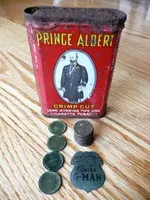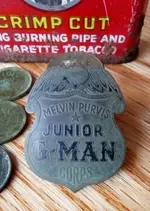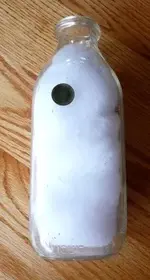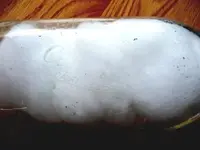Michiganne
Silver Member
- Joined
- Mar 27, 2007
- Messages
- 4,402
- Reaction score
- 550
- Golden Thread
- 0
- Location
- SW Michigan
- Detector(s) used
- Explorer SE
- Primary Interest:
- All Treasure Hunting
- #1
Thread Owner
Hi all,
I was fortunate to be invited to hunt a really nice site with my friend Ron. Lots of wooded acres, former 1800's farm, several old foundations, plus lake frontage...I call it "MDer's Nirvana." There were even porta-johns in the woods, although the mice had had a field day with the TP. Ron and I both found wheats but couldn't find any silver this time. My best find was the Melvin Purvis Junior G-Man corps badge. Melvin Purvis was a successful FBI agent who led the manhunts that caught outlaws such as Baby Face Nelson, Pretty Boy Floyd, and John Dillinger. Neat history, I'll include more at the bottom. Ron gave me a quart milk bottle he found at the last foundation. Is it hard to read, but says "Cloverleaf Dairy Company, Gary, IN." Also found my nicest Prince Albert tobacco container.
Ron and I both found wheats but couldn't find any silver this time. My best find was the Melvin Purvis Junior G-Man corps badge. Melvin Purvis was a successful FBI agent who led the manhunts that caught outlaws such as Baby Face Nelson, Pretty Boy Floyd, and John Dillinger. Neat history, I'll include more at the bottom. Ron gave me a quart milk bottle he found at the last foundation. Is it hard to read, but says "Cloverleaf Dairy Company, Gary, IN." Also found my nicest Prince Albert tobacco container. 
HH,
Michiganne
After leaving the Federal Bureau of Investigation and a brief stint in Hollywood, Melvin Purvis hosted a children’s radio program called “Junior G-Men” in 1936. Purvis had become a national hero for his record as an FBI agent during the so-called "war on crime" in the early 1930s, most notably for leading the manhunt that ended with the death of John Dillinger. As a result of this fame, Purvis was seen as a real-life counterpart to the fictional detectives, such as Dick Tracy, that proliferated in the popular culture targeting boys during this period. As part of the radio program, listeners could join a "Junior G-Men" club and receive badges, manuals, and secret agent props. Shortly thereafter, Purvis became the face of breakfast cereal Post Toasties promotional detective club. The cereal company’s fictional “Inspector Post” and his “Junior Detective Corps” metamorphosed into an image of Purvis inviting boys and girls to become “secret operators” in his “Law and Order Patrols.”
As a result of this mass exposure, Junior G-Men clubs sprouted up throughout the United States and Canada as a "law and order" themed alternative to the Boy Scouts. Junior G-Men clubs found support from police departments and non-profit organizations that saw them as a means of combating juvenile delinquency. The clubs structured children's time with activities designed to instill law-abiding attitudes, as reflected in their slogan "It's easier to build boys than to mend men."
I was fortunate to be invited to hunt a really nice site with my friend Ron. Lots of wooded acres, former 1800's farm, several old foundations, plus lake frontage...I call it "MDer's Nirvana." There were even porta-johns in the woods, although the mice had had a field day with the TP.
 Ron and I both found wheats but couldn't find any silver this time. My best find was the Melvin Purvis Junior G-Man corps badge. Melvin Purvis was a successful FBI agent who led the manhunts that caught outlaws such as Baby Face Nelson, Pretty Boy Floyd, and John Dillinger. Neat history, I'll include more at the bottom. Ron gave me a quart milk bottle he found at the last foundation. Is it hard to read, but says "Cloverleaf Dairy Company, Gary, IN." Also found my nicest Prince Albert tobacco container.
Ron and I both found wheats but couldn't find any silver this time. My best find was the Melvin Purvis Junior G-Man corps badge. Melvin Purvis was a successful FBI agent who led the manhunts that caught outlaws such as Baby Face Nelson, Pretty Boy Floyd, and John Dillinger. Neat history, I'll include more at the bottom. Ron gave me a quart milk bottle he found at the last foundation. Is it hard to read, but says "Cloverleaf Dairy Company, Gary, IN." Also found my nicest Prince Albert tobacco container. 
HH,
Michiganne
After leaving the Federal Bureau of Investigation and a brief stint in Hollywood, Melvin Purvis hosted a children’s radio program called “Junior G-Men” in 1936. Purvis had become a national hero for his record as an FBI agent during the so-called "war on crime" in the early 1930s, most notably for leading the manhunt that ended with the death of John Dillinger. As a result of this fame, Purvis was seen as a real-life counterpart to the fictional detectives, such as Dick Tracy, that proliferated in the popular culture targeting boys during this period. As part of the radio program, listeners could join a "Junior G-Men" club and receive badges, manuals, and secret agent props. Shortly thereafter, Purvis became the face of breakfast cereal Post Toasties promotional detective club. The cereal company’s fictional “Inspector Post” and his “Junior Detective Corps” metamorphosed into an image of Purvis inviting boys and girls to become “secret operators” in his “Law and Order Patrols.”
As a result of this mass exposure, Junior G-Men clubs sprouted up throughout the United States and Canada as a "law and order" themed alternative to the Boy Scouts. Junior G-Men clubs found support from police departments and non-profit organizations that saw them as a means of combating juvenile delinquency. The clubs structured children's time with activities designed to instill law-abiding attitudes, as reflected in their slogan "It's easier to build boys than to mend men."
Attachments
Last edited:











 . Interesting history as well. Thanks for sharing!
. Interesting history as well. Thanks for sharing! It is a lot of fun and I'm surprised more women aren't into this hobby.....or maybe I'm just different. LOL
It is a lot of fun and I'm surprised more women aren't into this hobby.....or maybe I'm just different. LOL 